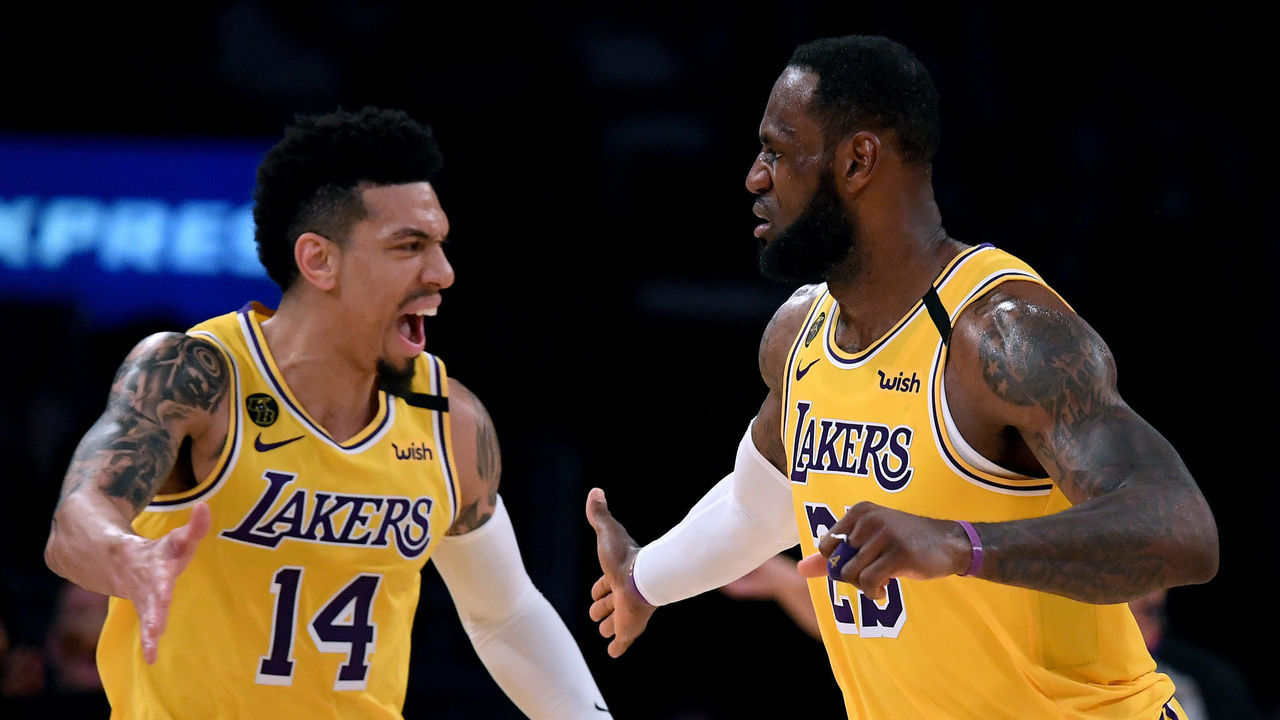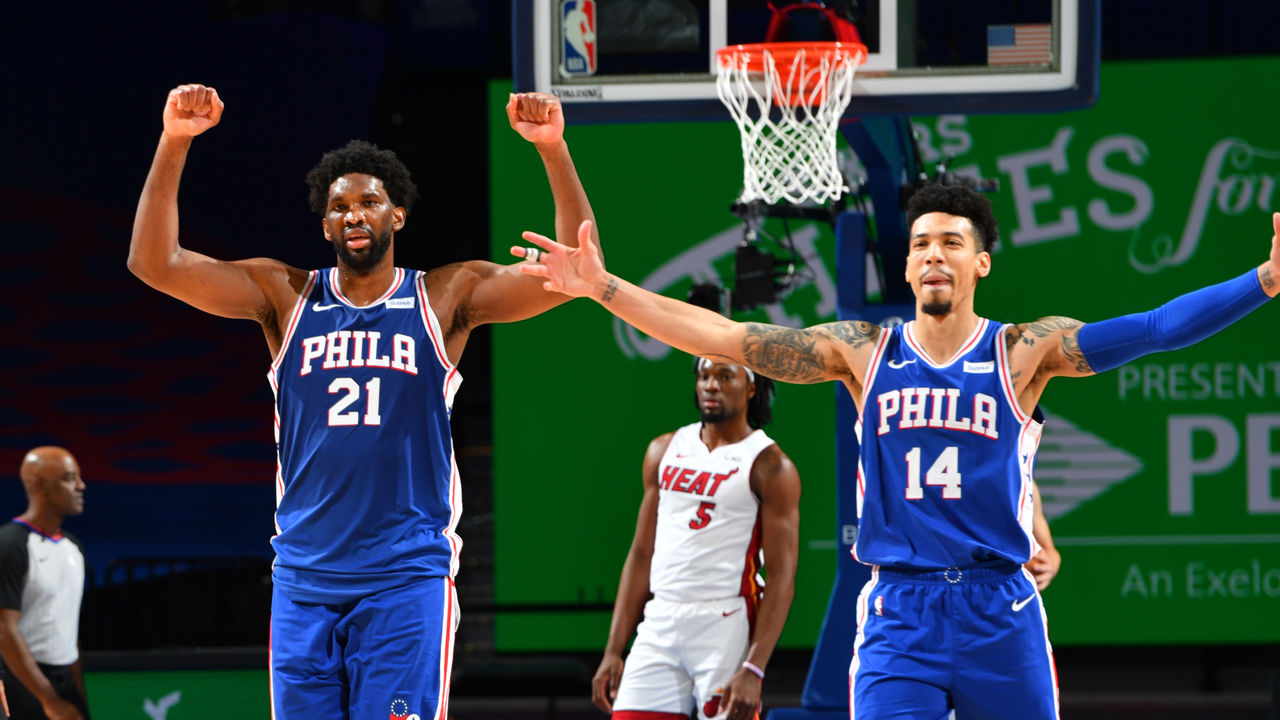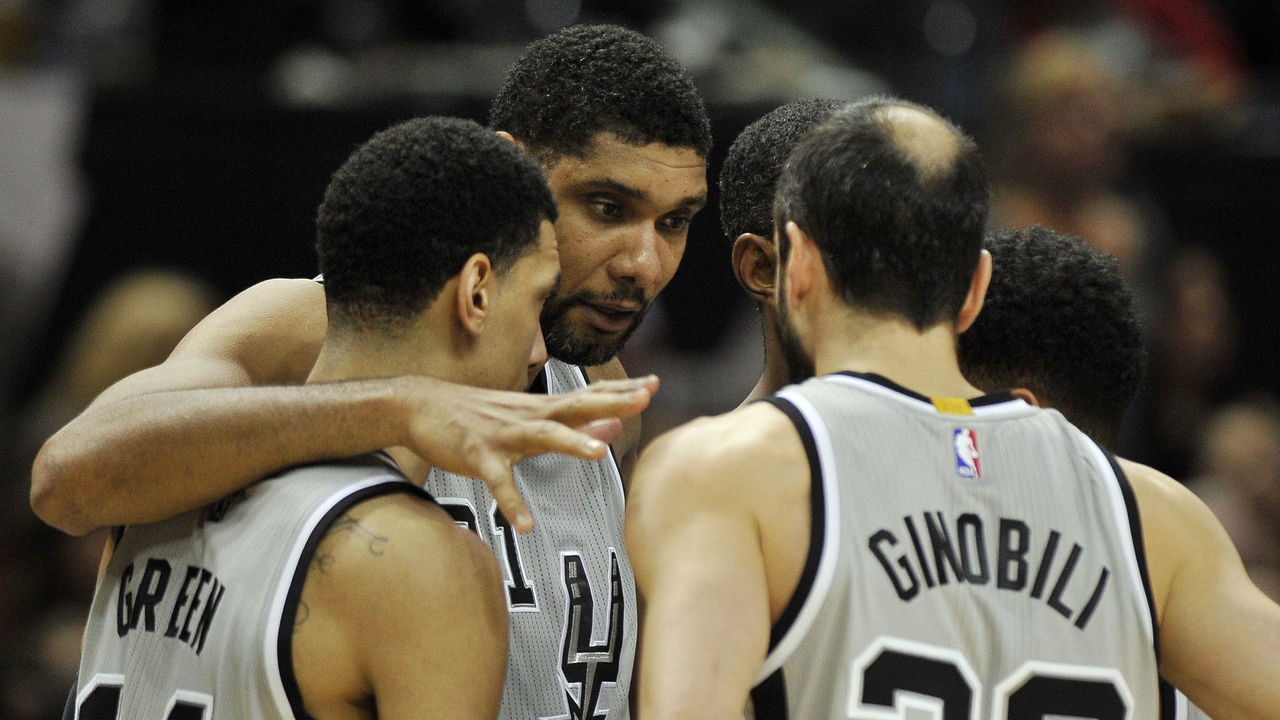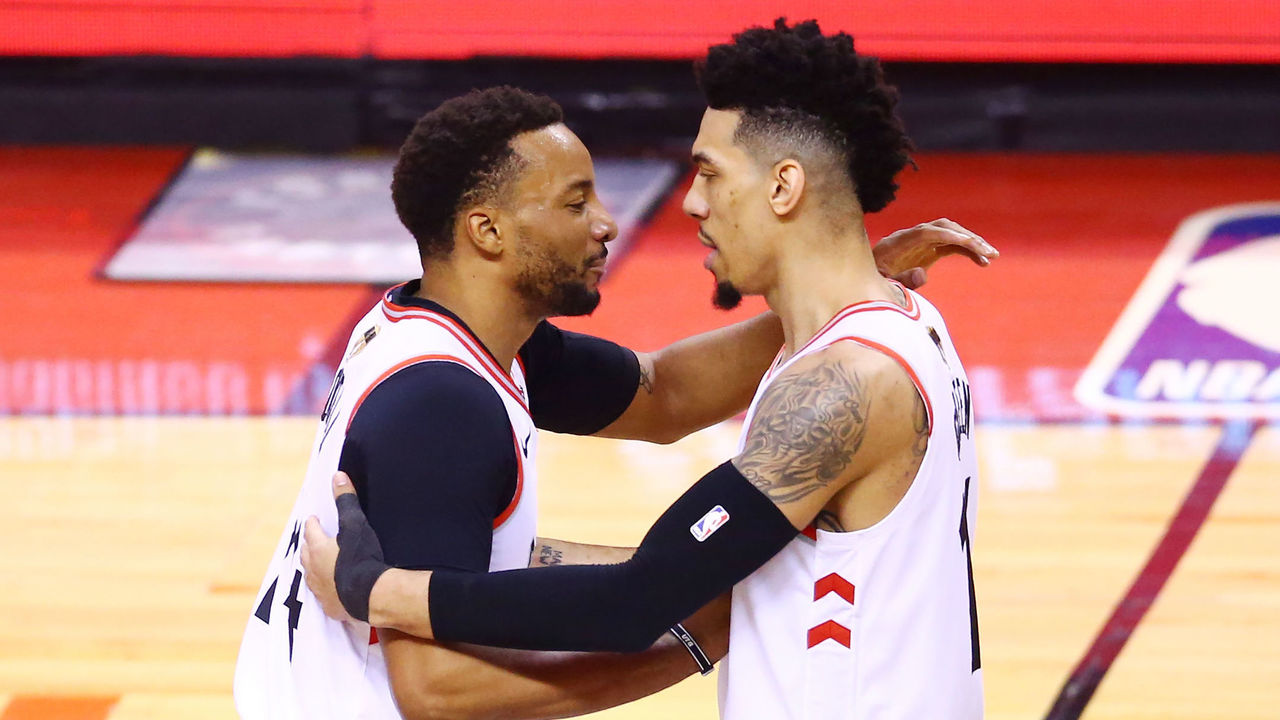What makes a good NBA leader? Ask Danny Green
Leadership is one of those intangible qualities that always gets mentioned when people discuss the keys to success in team sports. Everyone seems to agree that leadership is crucial, but it's difficult to characterize and impossible to quantify. Plenty of reasonable minds will disagree on the particular methods that create the best environment for success.
I've been thinking about what leadership in the NBA means ever since watching "The Last Dance," which, you may recall, chronicled Michael Jordan's basketball exploits and occasionally stopped along the way to show him terrorizing his Bulls teammates, who admitted to being afraid of him.
"Winning has a price, and leadership has a price," Jordan says at one point, in defense of his methods. "When people see this, they're going to say, 'Well, he wasn't really a nice guy, he may have been a tyrant.' Well, that's you. Because you never won anything."
It's an incredible line that captures Jordan's ethos as succinctly as anything we see or hear in the 10-hour documentary. It also reflects a reductive worldview. The ends Jordan achieved may have justified the means by which he achieved them, but surely intimidation and fear aren't the only motivational tools that can be used to get the most out of one's teammates. Right?
To get some insight into that question, I wanted to talk to someone who has won something. A lot of things, in fact. Someone who's done basically nothing but win since he entered the NBA: Danny Green.
In all but one of Green's 12 NBA seasons, the team he's played for won 50 or more games; in all but two, his team finished the regular season as a top-two seed in its conference. He's on track to hit both of those benchmarks again this year with the Philadelphia 76ers.
He's started 139 playoff games, second only to LeBron James among active players. He's won three championships with three different teams: the San Antonio Spurs in 2014, the Toronto Raptors in 2019, and the Los Angeles Lakers in 2020. Few players know more about the secret sauce that goes into a contending team than Green does.
Along the way, he's played with some of the greatest players and leaders of our age, and those experiences have taught him a lot about the value of leadership and the type of leader he wants to be.
"I've grown up under some leaders that did things I thought were effective, things that were cool, and things that were not cool, like bullying," Green told me in a phone interview. "There's certain things that you take from different people, but I learned a lot from every single one of my teammates: what to do and what not to do. Not a lot of what not to do, because most guys did things the right way."
The leaders he feels did things the wrong way were "guys that just didn't take accountability for their own actions, while pushing the blame onto other people," and who engaged in excessive criticism that crossed the line, "where it was just messing with guys sometimes."
"But," he added, "that didn't happen often with the guys I've dealt with."

The guys he's played with include myriad Hall of Fame-caliber players, from Tim Duncan, Tony Parker, and Manu Ginobili, to Kawhi Leonard and Kyle Lowry, to LeBron James and Anthony Davis, to present-day teammate and MVP candidate Joel Embiid. All of them have approached leadership in their own ways: some on the court, and some off of it; some with their voices, and others simply with their habits and their play; some through basketball acumen, and others via an interpersonal connection. The special ones, Green explained, have done it all.
"Obviously it starts on the floor, and how they lead with their actions. That's the common denominator with all of them," he said. "Some of them spoke up and were more vocal, some led by trying to create (off-court) chemistry. And it's hard to find one that can do all of the above. But some of them did.
"Timmy was one of the greatest teammates I've ever had, probably the greatest. LeBron, obviously, he's one of those few guys who did it in all aspects of leadership, whether it was on or off the court, chemistry-wise, putting things together and making sure we, as a group, hung out. That's very rare and very hard to do.
"But they were all great leaders. There were many moments with each one of them when I'd say, 'That's a leader, that's how a leader should be, and that's how I want to be.' But where it sticks out the most, the two guys mainly were Timmy and 'Bron. I had Kawhi when he was younger and he was still figuring out how to do it. Joel is still young, he's still coming into his own."
As for MJ's more abrasive methods, Green declined to throw his fellow Tar Heel under the bus. He did, however, stress the importance of being flexible and tailoring your approach to the specific person you're dealing with, especially in this day and age.
"I think it's different for different generations and different teams," he said. "There's different ways people respond and react. That (style) definitely worked for (Jordan); there's a reason why he won and was so successful. Now it might not be as effective, because we have a lot more sensitive players who grew up in a much more sensitive world.
"But that tactic might work for some people. Some people you get the best out of them when you push them, when you get them angry. Some guys can't take the yelling, can't take the criticism. Some guys you have to talk to and teach differently or encourage. There's different ways of leading. That's your job as a coach, as a teammate, as a leader: to figure out the best approach to certain people."

Green didn't make a qualitative assessment of that cultural shift, but it's notable that as he's become a locker-room leader himself, his approach to the role as he describes it is a decidedly supportive one. He aims to get the most out of teammates by building them up, rather than tearing them down.
"I always wanted to be that guy that people could come to, vent to when they needed to, be the mediation between a player and a coach, get (the player) to understand in their own terms and also just be comfortable and play their games and not think too much," he said.
"The biggest part is giving confidence and giving encouragement. That will definitely change a player's whole game and outlook. I've seen some of the most talented stars not be able to adapt because they didn't have the right timing or situation, or because they just lost their confidence. And I've seen some guys that weren't that good stay in the league longer than they should because of the confidence they got from their teammates and coaching staff. So, it goes a long way in this league."
There's an art to instilling that confidence. You have to pick your spots, know which buttons to push, know what a particular teammate needs to hear at a particular time, and make sure not to overwhelm a struggling player with too much advice or criticism at once.
"Everybody's going to be in everybody's ear," Green said. "Like, 'Talk to Dwight, or talk to so-and-so.' No, everybody's talking to him, I'm not gonna talk to him right now. I'll talk to him when I can come at it with a different approach and a different way for him to understand and see something. If I'm gonna talk to Joel or Ben (Simmons), I'm gonna approach them in a way that will help motivate them or help them get out of their own heads.
"As funny as it sounds with All-Star and MVP-caliber players, they all sometimes think about the game too much, sometimes get in their own heads. If you can talk to Tobias (Harris) or Joel or Ben and just be like, 'Yo, stop thinking so much, we're riding with you, shoot every ball if you're open, I don't care, you can go 0-for-30, we're riding with you,' that encouragement is what some people need.
"You could even see that with Draymond and KD (in Golden State). KD's one of the best players to ever play this game, and you had Draymond kind of coaching him up and encouraging him, telling him what they needed from him, (saying) don't ever second-guess yourself, nobody can stop you in this league."

Another feature of leadership is that it can be passed down; good leaders tend to beget more good leaders. Green spent the bulk of his career in San Antonio, where he was typically one of the younger players on a team full of pedigreed winners. And as he forged his own identity as a leader over the years, he was able to emulate and cobble together different qualities he admired from guys like Duncan, Parker, and Ginobili.
He and Leonard are two of just five players (and the only two starters) from the 2014 Spurs championship team who are still active in the NBA. But by absorbing leadership characteristics from everyone around him and putting them to use in subsequent stops, Green is helping keep the spirit of that team alive, and planting its seeds elsewhere.
When he and Leonard were traded to Toronto, Green got a chance to fully apply everything he'd gleaned from his years in San Antonio. He became the old head whose championship experience made him an invaluable resource to younger players like Norman Powell, OG Anunoby, Fred VanVleet, and Pascal Siakam, all of whom made major strides in the season Green was a Raptor and in the two seasons thereafter.
Now, as he chases a third straight championship with a third different team, he's doing the same with young 76ers players like Shake Milton, Matisse Thybulle, and Furkan Korkmaz.
"We had a lot of young guys in Toronto where I felt (the dynamic) was great, and also here in Philly," Green said. "In L.A. there were a bunch of guys who were older than me or the same age, so there weren't many guys I took under my wing. But those two teams, I've had a bunch of guys I've seen flourish and grow, from OG to Norm, Fred … Fred was already on his way, and Pascal, all those guys were already good when I got there. But they kind of learned from watching obviously Kawhi and hopefully myself operate.
"In Philly, there are a lot of young guys that are listening, and I'm kind of the mediator, helping them understand what Doc (Rivers) wants and what he needs. From Shake to Matisse to Furkan, I just try to talk to all those guys that are younger, even the superstar guys. But the superstar guys know what they need to do; it's not one of those things where they don't know their role or how to make their mark in this league. They've made their mark in this league already. The other guys need to find ways to do it without pressing, without being stressed out about it, and also being successful within the team and worrying about the team success first."

It makes sense that Green's guidance would be more salient for players like Milton, Thybulle, and Korkmaz. Those guys are never going to be superstars in the NBA, and who better than Green to demonstrate what's possible when one focuses on being a star in one's role?
Green acknowledged that trying to lead a team as a role player is much different than doing so as a star. There's less pressure to carry the team on the court every night, but you have to work a lot harder to earn teammates' respect.
"I think it helps that I have a younger group and I've been in the league long enough and I've been able to win. So that's how I guess some of the respect starts," Green said. "You also earn respect by taking accountability for yourself, your own actions, and by putting the work in. Nobody can not respect someone that puts in the work every day and has everybody's back and the team's back.
"But it's a harder route, and it takes a little longer to earn superstar players' respect or certain coaches' respect sometimes, and it's hard to have that say-so power in the organization. Usually, superstars have that power, where they want things done and (the team) listens to them. As a role player, they're not changing the organization's way of doing things because of what you say."
But no matter who it's coming from or what form it takes, Green is unequivocal about the fact that good leadership is essential.
"It's the main ingredient to any successful season or team," he said. "If there's no leadership there's no winning. There's no chemistry, there's no communication. You can have all the talent in the world, you can have all the pieces, you can have a great organization. If you don't have leadership, you're not going anywhere."
Joe Wolfond is an NBA feature writer for theScore.